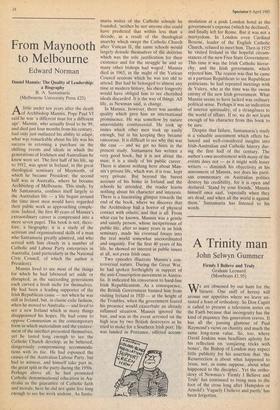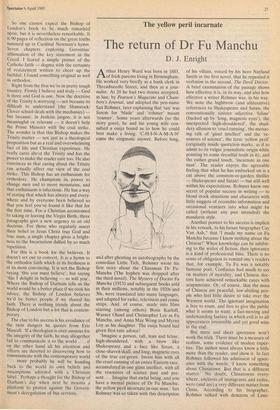A Trinity man
John Selwyn Gummer
Firmly I Believe and Truly Graham Leonard (Mowbrays £1.95)
We are obsessed by our hunt for the bizarre. One sniff of heresy will arouse our appetites where we leave un- tasted a feast of orthodoxy. So Don Cupitt is called to present a television series on the Faith because that incongruity has the kind of piquancy this generation craves. It has all the passing glamour of Paul Raymond's views on chastity and much the same long-term value. So, too, where David Jenkins wins headlines aplenty for his reflection On 'conjuring tricks with bones', the Bishop of London may expect little publicity for his assertion that 'the Resurrection is about what happened to Jesus, not, as some suppose, about what happened to the disciples'. Yet the ortho- doxy of Newman's 'Firmly I Believe and Truly' has continued to bring men to. the foot of the cross long after Hampden or Arnold's 'Vaguely I believe and partly' has been forgotten.
So one cannot expect the Bishop of London's book to be much remarked upon, but it is nevertheless remarkable. It is 90 pages of reflection on the great truths summed up in Cardinal Newman's hymn. Seven chapters exploring Gerontius' affirmation of the key statement in the Creed. I feared a simple primer of the Catholic faith — dogma with the certainty of restatement written to cheer up the faithful; I found something original as well as orthodox.
Right from the first we're in pretty tough country. Firmly I believe and truly — God is three and God is one. Now the doctrine of the Trinity is worrying — not because its difficult to understand (the Shamrock/ Clover school deals with the mechanics) - but because, in Jenkins jargon, it is not meaningful or relevant — it doesn't help the Prime Minister with the coal strike.
The wonder is that this Bishop makes the Trinity matter — not just as a theological proposition but as a real and overwhelming fact of life and Christian experience. He really cares about the Trinity and has the power to make the reader care too. He also convinces us that caring about the Trinity can actually affect our view of the coal Strike. This Bishop has an enthusiasm for orthodoxy. He champions its power to change men and to move mountains, and that enthusiasm is infectious. He has a way of stating that which has always and every- where and by everyone been believed so that you feel you've found it like that for the first time. For a Christian accustomed to taking or leaving the Virgin Birth, three paragraphs give a new urgency to an old doctrine. For those who regularly assert their belief in Jesus Christ true God and true man, a single chapter gives a bright- ness to the Incarnation dulled by so much repetition.
For this is a hook for the believer. It doesn't set out to convert. It is a hymn to the orthodox faith which in its freshness is at its most convincing. It is not the Bishop saying 'this you must believe', but saying 'this I delight in believing — so will you'.
Where the Bishop of Durham tells us the world would be a better place if we took his advice, the Bishop of London believes we'd be better people if we shared his faith. There is nothing trendy about the Bishop of London but a lot that is contem- porary.
The clue to his success is his avoidance of the twin dangers he quotes from Eric Mascall. 'If a theologian is over-anxious for the integrity of the faith, he may altogether fail to communicate it to the world . . . if on the other hand all his attention and efforts are devoted to discovering how to communicate with the contemporary world • . . more probably he will be handing back to the world its own beliefs and assumptions adorned with a Christian, label.' Perhaps a thought for the Bishop of Durham's day when next he mounts a platform to protest against the Govern- ment's deregulation of bus services.











































 Previous page
Previous page